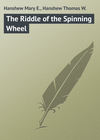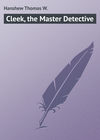Kitabı oku: «The Riddle of the Night», sayfa 10
CHAPTER NINETEEN
PICKING UP THREADS
Young Raynor was not in the smallest degree upset at sight of the thing. He was mildly surprised, and expressed it by a low, soft whistle as he reached out his hand and took up the bracelet.
"Well, of all the mutton heads! Shows what a thoughtless beggar I am!" he said with a slight lurch of the shoulders and an impatient twitch of the head. "No need to ask you how you came by the blessed thing, dear boy. Found it in the inside pocket of that coat you're wearing, I know. That's where I put the bally thing, I recollect. What an ass of me to forget all about it. Hope she won't think I've bagged it."
"She?" said Cleek, with admirable composure, considering that this open admission, this evidence of there being nothing to conceal, threatened to upset all his calculations. "Antecedent of that personal pronoun, please; who may the 'she' in question be?"
"Why, Mignon, of course."
"Mignon?"
"Yes, Mademoiselle Mignon De Varville, the famous Whirlwind Dancer of the Paris Variétés. You know her, or ought to, considering that you got a peep at her phiz in spite of me this afternoon."
"Not 'Pink Gauze'? The lady of the tobacco jar?"
"The very identical. Little bit of all right, that – eh, what?"
"Looked like it, at all events," said Cleek, selecting a cigar and lighting up. "What a lucky beggar you are, dear chap – all the good things seem to go your way. And so" – puff! puff! – "Pink Gauze gave you the bracelet, eh? When? Last night? Or didn't you see her then?"
"Oh, I saw her last night, right enough; in fact, I've seen her pretty nearly every night since she came over from Paris, but she didn't give me the bracelet to take care of then. That was on the night before – over at her little place, you know."
"No, I'm blest if I do. How should I? Never saw or heard of her, dear boy, till I had the misfortune to break that tobacco jar and tumble out her photo. So her name's Mignon de Varville, is it? And she's got a little place of her own, eh? Where? In this neighbourhood?"
"Lord, no! Beyond Wimbledon. Rippin' little place, too. Clinkin' little house standing in its own grounds and fitted up to the nines. Took it furnished, and gives the rippin'est suppers and the jolliest dances going. Hot stuff, I give you my word. Brought over her entire troupe with her. Rehearsing now, and with all their evenings to themselves. Going to open in London in a fortnight's time, she says, and no English hotels for her and her little lot. There are ten of 'em: five spiffin' pretty girls, and five of the most awful-lookin' Johnnies you ever saw in evening clothes since the hour you were christened. Coarse as dog's hair, every mother's son of 'em, but clinkin' good chaps, for all that. Plenty of champagne, and jolly good champagne it is, too, dear boy; and after supper there's always a dance, two of the chaps and two of the girls sitting out and furnishing the music. And Lord, you don't know what a dance is, Barch, till you've had one with Mignon de Varville, my boy!"
Cleek did not dispute the assertion. He had had many with the lady in those old days that lay forever behind; and it needed no man's word to tell him how tirelessly, how joyously, and with what mad abandon Margot could dance when the fever of music and wine got into her blood.
"My hat! I'll be choking you from sheer jealousy, presently, you lucky beggar!" he said enviously. "All the plums seem to fall over on your side of the wall, dash you! and here am I sitting solitary and alone in a howling wilderness with not even one. I say, how the dickens did you ever come across this French lot? Blest if I can seem to meet with any– French, English, or any other sort, dash it! Where did you meet the charming Mignon? In Paris?"
"No fear! You can fall in with anything going in London if you only know the ropes, dear boy, and are popular. Flossie Twinkletoes introduced me to her. She'd just come over from Paris, and Flossie was out of work through the failure of 'The Seaside Girl,' and asked me to take her to supper and meet a friend of hers. I did – and the friend was Mignon. After that – well, you know how it is, dear boy. When a fellow knows his way about women will run after him. Mignon and I took to each other from the first, and we've been jolly good pals ever since. Invited me to her place before we'd known each other half an hour. Fact, dear boy. And she's rather exclusive, too, I can tell you. Just how exclusive you may guess when I tell you that I'm the only living man outside of those who belong to her troupe that ever sees the inside of her house or shares one of those rippin' evenings there."
The curious one-sided smile travelled up Cleek's cheek, hovered there a moment, and then disappeared. He said nothing upon the subject, but it was perfectly clear to him just why Mr. Harry Raynor was the only stranger present. He knew Margot and he knew her methods. This one man was desirable because she had an especial use for him; and he meant to make it his business to find out just what that especial use might be. So, then, she had abandoned her customary tactics for once, and had brought some of the female members of her crew to England with her, had she?
The murder of De Louvisan looked more than ever like an Apache crime, in the light of these things. But why an Apache crime? Margot's game was always money; and the pseudo Count de Louvisan had not a shilling to bless himself with. Again, if it were an Apache crime, how came a man who was undeniably Lord St. Ulmer – undeniably everything that he claimed – to be mixed up in the affair to such an extent as he was? And what of Lady Clavering? Where did she come in? What had taken her out upon the Common last night? What of young Geoff? What of his father? And what, of all things, about Lady Katharine Fordham?
None of these people could be connected with Margot – with the Apaches. He had his own ideas relative to Lady Katharine's part in the puzzle, but there was still that bundle of buried clothing, still the fact that it was found in the grounds of Wuthering Grange, and that it was highly improbable either Margot or any of her crew could have put it there. Still, Margot had a purpose in "catching" Mr. Harry Raynor; and if – Ah, well, you never can tell. Shallow-looking pools are sometimes very deep. Which, then, was Mr. Harry Raynor: the brainless fool he appeared, or a very excellent actor playing a very cunning part?
During the moment it had taken for these thoughts to travel through his mind, Cleek's whole attention seemed to be claimed by his cigar, which, for some unknown reason, appeared to have an objection to draw. Now, however, he flung the thing aside.
"Pardon me, dear boy, if I have seemed inattentive," he said. "Please go on. What was it you were saying? Oh, ah! I recollect: about your being the only guest that Mademoiselle What's-her-name ever asks to her blessed kick-ups. Lay you a tanner I can tell you why, old chap."
"Can you? Then why?"
"Either she's clean gone on you – which, no doubt, is very likely – or she's trying to get something out of you. Ever give you what our Yankee cousins call the touch? Ever try to get anything out of you?"
"Not a blessed rap. Never wanted anything from me. That is, anything in the money line, I mean. Hinted pretty strongly at something else, however; but, of course, I wasn't taking any on that score!"
"Weren't you? Why not?"
"Don't be an ass, Barchie! You've seen the pater and mater, and you can judge for yourself just how impossible it would be to even hint at having a girl like Mignon asked over here to dinner one night just simply because she has, as she says, an intense yearning to see how people of the better class in England live and conduct themselves in their own homes."
Cleek reached for another cigar and lit it. Oho! so that was how the cat jumped, was it? That was Margot's little game, eh? She had taken up with this engaging young man merely for the purpose of getting an entrée to Wuthering Grange. Clearly, then, there must be something or some one under the roof of this house that she desired to get in contact with; and having failed to get invited, as she had hoped – Yes, of course! Cunning of her, diabolically cunning. Forgotten all about the bracelet, eh? Not she! He knew her like a book. It would be an excuse to come over in person to ask for its return. "So sorry; but called away suddenly, and couldn't possibly wait for you to bring it back." That sort of thing, and – well, there you are. Ah, she was the very embodiment of craft and cunning, that lady: cut her off at one door and she would make her way round to the other.
"Wasn't aware that it was anything of that sort, dear chap, or I shouldn't have asked," said Cleek, responding with the utmost serenity to young Raynor's remark. "Of course you couldn't do anything of that sort, so it was deuced wise of you to ignore the hint. Rum what fancies women of that sort have, eh? And how blessed crafty they are in getting what they want! You look out, dear boy, that she doesn't come over here after that bracelet. Lay you a sov that's why she got you to take charge of it."
"Lay you another it isn't," replied the young man, with a smile of confidence. "You don't know the facts, dear boy, or you wouldn't jump to such silly conclusions. She gave it to me because the blessed thing would keep coming undone and falling off and interfering with our waltzing. Besides, it wasn't she – it was I – that suggested that I should put it in my pocket for safe keeping until the dancing was over; and, like a blithering idiot, you see, I forgot all about it. Blessed lucky thing for me that I had to lend you a suit of evening clothes, b'gad, or I might not have found the bracelet for heaven knows how long."
"And a blessed lucky thing for me that you turned up in time to lend it to me," said Cleek, in reply. "Never was in such a beastly funk in all my life, dear chap. Could have said a prayer, if I knew any, I was so blessed glad when I looked out and saw you standing in the passage. I say, how did you come to be there, Raynor? Thought you were heaven knows how far away, and blest if I can think where you came from."
"Popped out of St. Ulmer's room. Next one to yours. Was in there when that sneak thief appeared."
"In there? My hat! What a rum idea! Thought you didn't care for the old josser. At least, you spoke as though you didn't this afternoon; and to have you sitting in there and kow-towing to a gouty old sick man – "
"Wasn't sitting in there, dear boy. Had just popped in on my way up to dress. Evening papers full of that business at Gleer Cottage last night. Bought several of them at the railway station. Happened to think that, maybe, the old bounder hadn't read the news and would be interested in it, so just dropped in to give them to him. That was all."
"Oh, I see," said Cleek. "That accounts for it, of course. Wondered how the dickens you came to be there, and what on earth had called you back home so early after you'd told me not to expect you until twelve. By the way, dear boy, what did call you back, if it isn't an impertinence to ask. Needn't bother to reply if you'd rather not." This latter, for the reason that at the mention of his coming back earlier than expected, young Raynor's lips had come together in a sharp, hard, narrow line, and his eyes had assumed an absolutely savage expression. "Sorry if I've poked my nose in where I'm not wanted, old chap, deuced sorry."
"Oh, that's all right," said Raynor, reaching for the decanter and pouring out a fresh peg of brandy. "Don't bother about treading on my corns. Of course I'm a bit sore on the subject, but – well, I like you, Barch; I like you no end. Besides, I was going to tell you, anyhow. Remember, don't you, that I said I was going to give you a shock?"
"Oh, ah! Yes. Blest if I hadn't forgotten. And I thought I was going to give you one, too, about the bracelet; but it didn't come off. Maybe yours won't either, dear boy."
"Oh, don't you make any mistake upon that score. Lay you a fiver it makes you sit up when I spring it on you. Shove that siphon over this way, will you, dear boy? Thanks, very much. I say, Barch – chin'-chin', old chap! – I say, you want to know what sent me back so unexpectedly, do you, eh? Well, you may."
"May I? Thanks. Then what did?"
"Same thing that called me away in the first place – a blessed swindle!"
"The dickens you say? What sort of a swindle, old chap, eh?"
"A forged letter. Somebody wanted to get me away from this house for some purpose or another, and to keep me away until late to-night, too. I don't know why, and I don't know what for, but I'm jolly well certain who the party is, b 'gad; and it's a howlin' eye-opener, I give you my word! Wait a bit!"
He got up suddenly, walked to the door, opened it a foot or so, peeped out, then reclosed it and walked back to his seat. He poured out a third brandy, and drank it almost neat this time, then put his elbows upon the table, and, leaning forward, looked straight into Cleek's eyes.
"Barch, I've discovered something," he said in a lowered voice. "My father's playing a double game. He's a damned old two-faced hypocrite, that's what, and I've found him out at last!"
The cigar dropped suddenly from Cleek's fingers, and he ducked down in quest of it. He simply had to have some excuse to cover up the state of his feelings, or they would have got the better of him. A while ago he had said to himself that the fellow was despicable enough to implicate his own parents if it were necessary to save his skin; but even then he had only half believed it; now, however, he knew, and a fierce indignation bit into the very soul of him.
The worm had suddenly developed into a viper.
He went on groping for the dropped cigar. He might have found it at once had he chosen to do so, but he did not. It needed a moment or two to whip his savage desires into subjugation, to get himself well in hand again that he might face this unnatural son without giving way to the temptation to thrash him; and all the while his head was whirling with the crushing recollections that were crowding into it.
If it were worth his while – to save his own skin, to divert suspicion from himself – Well, was it not worth his while now? The chase was narrowing, and perhaps he knew it – one could not be certain what such a man would find means of discovering. Perhaps he knew of the unearthing of the buried clothing. Perhaps he knew that there was proof the murderer had been traced to Wuthering Grange, and knowing, realized the necessity for diverting suspicion from himself, if he were guilty? But, guilty or innocent, principal or accessory, this one thing was certain: last night a murder had been committed; last night a dead man had been spiked to the wall in true Apache fashion; and this Mr. Harry Raynor, who was casting slurs upon his own father, was hand and glove with the Apache queen!
CHAPTER TWENTY
"HOW SHARPER THAN A SERPENT'S TOOTH"
Cleek found his cigar at last, and rose with it in his hand, leaving young Barch to finish his story in his own inimitable way.
"Yes," he continued, "what I call a regular facer for me. I was swindled into going away by a forged letter, which I swear he wrote himself. Recollect, don't you, that when you came to meet me at the ruin, I told you I'd suddenly been called away? Well, so I had. While I was waiting there at the ruin for you to get shot of that muff Geoff Clavering and come to join me, up walks the pater and hands me a letter – a typewritten letter, mark you – with word that a messenger had just brought it. Now listen to this closely, Barch! Last January some fool of an editor suggested to my pater that he should write a series of articles upon the proper cultivation of hot-house fruits for his tomfool paper, and said that typewritten copy was absolutely necessary. Out goes the pater and buys a typewriter, and engages a girl to operate it. Got her from some typewriting school in town, and a rippin' fine little girl she was, too! Name, Katie Walters. Pretty as a picture and lively as a cricket. Well, Katie and I became jolly good pals. Pater found it out, and then just what you might have expected happened. I got a lecture, and Katie got the sack and was packed off to town before I could get a private word with her. Now, the letter my father handed me this afternoon was supposed to come from that girl."
"And didn't?"
"No, it didn't. It asked me to run up to town and meet her just outside the typewriting school when the day's work was over. I went, but I didn't do exactly as I'd been asked. I suppose the party that wrote it hoped that I'd wait there until dark, and that when she didn't come out I'd come to the conclusion that I'd missed her, and, being in town, would probably go somewhere else and make a night of it, as I most likely should have done under ordinary circumstances. But I didn't feel like waiting round for that bally school to close; so as soon as I got there, I walked upstairs and asked to see her."
"Humph! And she wasn't there?"
"No, she wasn't. And what's more, she hadn't been there for weeks and weeks. Had got a position up in Scotland, and is going to be married to a bank clerk next month."
"Oho!" said Cleek, "I see! I see!"
He walked over to the other side of the room, where there was a huge potted azalea on an ebony pedestal. He had admired and he had examined that azalea earlier in the evening, so it was, perhaps, only natural that he should be attracted by it now. Still, for once in a way, it was not the blossoming beauty of the plant that lured him to it, much as flowers always had and always would appeal to him. He could see the trend of young Raynor's tale now, the dim, shadowy outline of the argument he was putting forth, the suspicion he was endeavouring to lead; and he was afraid that something in his face or his eyes might betray the true state of his feelings if he remained there in the bright light for the man to study him. The big azalea offered the refuge of shadow. He walked there and stood in the shade of it, and began idly poking at the earth in the huge pot.
"Naturally, dear boy," he went on, "when you heard that you knew that you had been taken in."
"So I did, on the instant," said young Raynor, tackling yet a fourth glass of brandy. "It was as plain as the nose on your face that somebody had tried to spoof me; somebody had an interest in sending me off to town on a wild-goose chase and getting me out of this neighbourhood to-night, and that that somebody hadn't reckoned upon my doing what I did, and didn't know about my having promised you to take you to see Mignon de Varville, when that blithering letter intervened. And speaking of that – I say, Barchie, we'll go to-night, if you like – eh, what?"
"Sorry, dear boy," said Cleek, whose intention was to get out on the Common to-night and test the truth of Geoff Clavering's story; "sorry, but I'm afraid we'll have to put that off until to-morrow. Thinking you weren't coming back in time, I arranged with the ladies for an evening of bridge; so, if you don't join us, you'll have to pay your respects to 'Pink Gauze' to-night without me. And, by the way, how did you get that bit of pink gauze, old chap? Any particular significance attached to it?"
"Lord, no! Bit of gauze scarf she wore the other night – always wears pink, by the way – caught in my watch chain. Tore in gettin' loose, and I kept the bit as a memento."
"Ah, I see. Well, get on with the other subject; I'm immensely interested. As soon as you'd found out that Katie What's-her-name couldn't have written the letter, and that you'd been deceived by somebody, then what?"
"Why, then I put back home by the first possible train. I had my suspicions – yes, rather – so I came back to prove them true."
"And did you?"
"Ah, didn't I? Nobody knew of my affair with Katie outside of my father, and my father has a typewriter ready to hand, and typewriters don't betray anybody's 'fist.' I went to the lodgekeeper. No messenger had passed him to-day. I went to Hawkins and Hamer. No messenger had brought any letter that they knew of to the house. I couldn't ask Johnston, because this is his evening off; but no doubt that when I do ask him he'll say the same. Well, now, you put all those things together, Barch, and see for yourself what they make. As nobody but my father knew anything about the girl, and nobody gave him a letter, and he has a typewriter ready to hand, why there you are. He wrote the letter, that's what. And if he wrote it to get me away and keep me away until late at night, why he's got a devilish good reason for it; and if he has got a reason for doing things at night that he doesn't want other people to know about and doesn't want his own son to discover, then he's playing a double game. And last, when a man sets himself up for a howling saint in the virtue line and yet plays a double game, why he's a rotter and a hypocrite, whether he's my father or not, and I'm not going to stand it." He nodded with drunken solemnity. "I'm going to have it out with him to-night, you'll see. Come with me if you like – "
"Not I, old man, I've promised to join the ladies, see you later, eh?" said Cleek, and with a look of unseen contempt at the drink-sodden figure, he turned abruptly and left the youth to continue his potations at his own sweet will.





